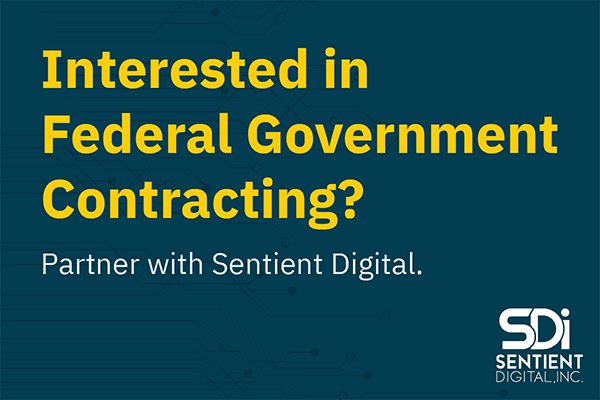Whether your organization is interested in getting into doing contract work for the federal government, or even if you are a seasoned government contractor, there are several trends in government contracting you need to know about in 2024. Each year is different in government contracting, but some aspects of the previous year will carry over into the new one. From lingering impacts of the global pandemic to the potential uncertainty that comes with an election year, the conditions in the federal government space in 2024 are complex, but participating in government contracting can be very rewarding for your organization.
Sentient Digital, and RDA, our subsidiary, have extensive federal contracting experience and share our insights in this post so that you are prepared for the competitive, yet rewarding, environment. Continue reading to learn about 2023 patterns that may continue in 2024, as well as ways that 2024 may be very different.
The Federal Contracting Context Following 2023
To understand what the federal government contracting landscape is like in 2024, it helps to understand what 2023 was like. In Fiscal Year 2023, federal agency contracts totalled $774 billion, a new record. Contained within this number was $487 billion in Department of Defense contracts. Clearly, 2023 was a lucrative year for government contractors. However, this does not mean that everything will be smooth sailing throughout calendar year 2024. For example, as of mid-January 2024, Congress still has not approved a budget for Fiscal year 2024, which began in October 2023. The federal government contracting trends of 2024 will take into account this balance of opportunity and some cause for caution.
The Top 2024 Trends in Government Contracting
Some elements of the 2023 government contracting reality have carried over into 2024. The direction of federal government acquisition in 2024 continues to be shaped by effects of the recent pandemic, such as inflation and supply chain issues, as well as the Biden administration’s priorities, particularly those favoring small businesses. So, what are some of the top trends in government contracting for 2024?
Prioritizing Artificial Intelligence
Artificial Intelligence saw explosive growth during FY 2023, so it makes sense that it would be a significant priority in 2024. The government is of two minds when it comes to AI. On the one hand, agencies know they need to incorporate AI into their operations to increase efficiency and effectiveness. A federal government website about AI includes use cases by agency, showing the many and varied ways that AI can improve government processes. For example, the Social Security Administration’s use cases include finding people receiving disability payments whose medical conditions are most likely to improve over time and marking them for a continuing disability review. The Department of Education is using AI to power a financial aid chatbot. The EPA is using AI-powered modeling to predict the health risks posed by chemical exposures. Another way that AI can benefit the government is in military simulations, including SDi’s Red Emergence. These diverse applications show the many useful ways that the work of the federal government can benefit from the use of AI.
On the other hand, the Biden Administration has called for increased regulation of AI to ensure it is implemented ethically and responsibly, including issuing a recent executive order on the subject.
A December 2023 Government Accountability Office report found that agencies had begun using artificial intelligence without comprehensive guidelines across the federal government being in place and enforced.
The objectives of benefitting from AI’s capabilities and using regulation to mitigate its potential misuse do not need to conflict, but indicate the considerations that will be reflected in AI-related opportunities.
Strengthening Cybersecurity: One of the Ongoing Trends in Government Contracting

As technology advances, so does the need for enhanced protection against cyber threats. Cybersecurity remains an important focus area for the federal government, and having state-of-the-art solutions is an imperative. From the increased threats posed by bad actors misusing artificial intelligence, to the ongoing security vulnerabilities inherent in the increasingly connected aspects of modern life, cybersecurity continues to form a critical aspect of national security. The federal government contracting opportunities for cybersecurity solutions providers will continue to be robust in 2024.
Paving The Way for Small Business Partnerships and Expanding Opportunities

The Biden Administration is prioritizing small business contractors, encouraging agencies to seek to work with them and working to make it easier for small businesses to get contracts. A recent Fact Sheet on the administration’s efforts to explains that to expand federal contracting opportunities for small businesses, new OMB guidelines have been issued to agencies about multi-award contracts, urging them to begin the planning process for these contracts sooner, as well as adding “on-ramps” so that small businesses can join a multi-award contract that is already in progress. Additionally, the Small Business Administration’s Empower to Grow (E2G) program will support small businesses with training and events to help them navigate the contracting process.
A February 2023 executive order requires agencies to submit annually an Equity Action Plan that includes information about “potential barriers that underserved communities may face” in government contracting. This order includes a provision that sets a 15% goal “for Federal procurement dollars awarded to small business concerns owned and controlled by socially and economically disadvantaged individuals (SDBs). Although that goal is for 2025, agencies may begin working towards it in 2024, so it is worth being aware of this if it may apply to your business.
Additionally, the requirements for being considered a small business have been changed, so businesses that were previously considered too large to qualify for small business programs may now qualify. Small business-focused programs can provide a major benefit for small businesses to be able to participate in the highly competitive federal government contracting process. For example, the Small Business Innovation Research Program (SBIR), provides funding for small businesses to engage in specialized research and technology development.
The Continued Prominence of IDIQs and BICs
Indefinite delivery, indefinite quantity (IDIQ) contracts allow agencies to contract for a nonspecific amount of a good or service during a specified time period. These streamlined contact vehicles make it easier and faster for the federal government to obtain what it needs, and were popular in 2023, so it makes sense for your organization to be watching for these opportunities in 2024. Additionally, they tie into the focus on small businesses, as some are well-suited for small businesses, while others are specifically set up for them. Sentient Digital has found success with an IDIQ with Military Sealift Command (MSC) for cloud migration.
However, there is also an argument that multiple-award IDIQs can be difficult for small businesses. On the other hand, Sentient Digital has enjoyed great success with multiple-award IDIQs, including it with the Naval Air Warfare Center Aircraft Center Division (NAWCAD) Rapid Acquisition Prototyping Integration and Development.
Another type of contract to be aware of, Best In Class (BIC) contracts have also become more prevalent in the past few years, and may continue to do so in 2024. Best In Class solutions are essentially pre-approved by the Office of Management and Budget (OMB) as meeting certain criteria. The expansion of the use of BIC contracts may pose a problem for small businesses who want to participate in the federal government contracting process, because they require more money at the start and therefore may seem to be out of reach.
Supply Chain Issues and Lingering Impacts of Inflation
In recent years, the supply chain was disrupted by the global pandemic and the effects have not fully abated. For this reason, the federal government has emphasized the importance of securing the supply chain, as well as ramping up domestic production of goods. Additionally, although inflation decreased quite a bit in 2023, it may continue to impact costs in 2024, which will affect both what the federal government can afford to buy and what businesses can afford to provide.
Uncertainty in an Election Year
Since 2024 is a presidential election year, agency spending priorities may change depending on whether a change in leadership will occur in 2025. Whether agencies see themselves as wrapping up their current work in anticipation of priorities changing in a new administration or setting up for the future of the current administration depends on what happens in the 2024 election and will shape their contracting decisions. While the election will not take place until fiscal year 2025, the calendar year 2024 will be shaped by the path to the election and will be felt in the government contracting space.
Interested in Federal Government Contracting? Partner with Sentient Digital
The popularity of various trends in government contracting will continue to change with each passing year, as political, social, and economic conditions change. However, one constant you can rely on in government contracting is the importance of developing high-quality partnerships. This is particularly true for small businesses or non-traditional contractors, who can benefit from the guidance of larger or more experienced contractors.

Sentient Digital focuses on custom technology solutions for federal government, military, and private sector clients. Our areas of expertise include artificial intelligence, cybersecurity, and systems engineering. Federal government contracting has been a significant portion of our business for years, and we are always looking to partner with other organizations who share our commitment to quality and passion for supporting federal government objectives. Reach out to us today to learn more about working with us.

